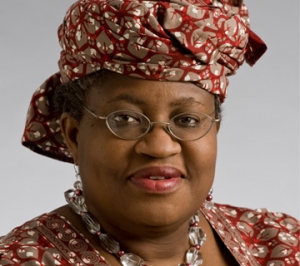Nigeria’s Finance Minister, Dr. Ngozi Okonjo-Iweala, has
given an assurance that the government has put strategies in place to
deal with falling oil prices for as low as $60 dollars per barrel.
The Minister said the scenario-based approaches developed to cushion
the unfavourable effects of the falling prices are comprehensive and
supported by extensive consultations with global analysts such as the
International Monetary Fund.
She said short to medium term strategies, mainly targeted at the poor and vulnerable, had been developed.
“People should not get fixated on the $73 dollars. It is just the
midpoint of the range we have. If it falls to $70, we are ready with
additional measures. We have organised a set of measures around $73
dollars. We have further measures at $65 and a third set of measures at
$60,” she said.
Dr Okonjo-Iweala said part of the medium term strategy was a revenue
target of three billion dollars over the next three years with
substantial cuts on expenditure both recurrent and capital.
She, however, said the cuts would not affect priority sectors –
infrastructure, health, education and security – that would focus on the
poor and average Nigerians.
While presenting a master plan for the Nigerian capital market
towards global competitiveness, at an event that brought together
experts and key players in the financial economic sector, held on
Thursday in Abuja, the Minister tried to ease Nigerians nerves, as the
recent devaluation of the Naira had started showing multiplier effect on
cost of goods.
Key issues in the economy came up for discussion and first among them
was the falling oil prices and the consequences on the economy.
The minister also assured the participants that the medium term
strategies to cushion the falling oil prices would prioritise sectors
that directly affect the poor and vulnerable.
But for most of these strategies to work, a robust capital market
that will provide long term finance for developmental projects is
needed.
This is what the master plan developed by the Securities and Exchange
Commission, the body regulating the capital market, is set to tackle.
The plans so far announced by the key players in the financial
economy are targeted at creating wealth and opportunities for many
Nigerians.
The Finance Minister emphasised that although the global environment
was uncertain, Nigeria had the strategies to cushion the effects.
Crude oil sales is Nigeria’s major source of revenue and the price of
crude has in the last few months hovered around $80 and the drop in
price has forced the government to adjust the crude oil price benchmark
used in the proposed 2015 budget that has not been submitted to the
National Assembly.
In the midst of the drop in price, the Nigerian government announced austerity measures aimed at cushioning the effect of the drop in crude oil price.

No comments:
Post a Comment